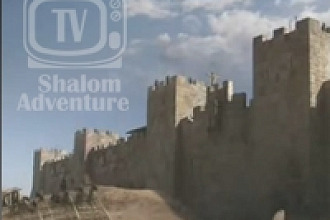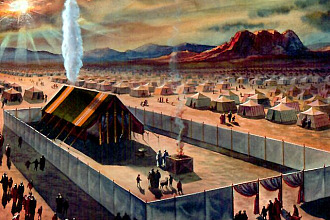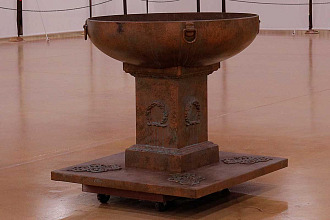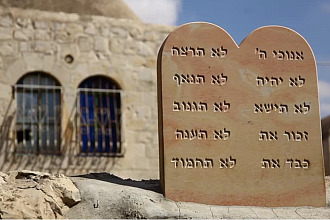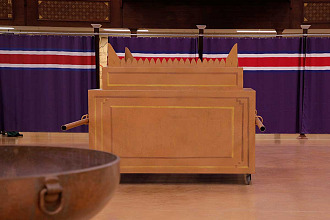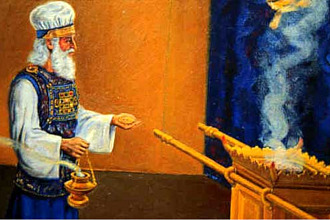Parasha for the Week: Tsav: Leviticus 6:1 - 8:36.
Haftarah for the Week: Jeremiah 7:21 - 9:23.
Besorat Yeshua: Romans 12:9 - 15.
Overview
The Torah addresses Aharon and his sons to teach them additional laws relating to their service.
The ashes of the korban olah -- the offering burnt on the altar throughout the night -- are to be removed from the area by the kohen after he changes his special linen clothing.
The olah is brought by someone who forgot to perform a positive commandment of the Torah. The kohen retains the skin. The fire on the altar must be kept constantly ablaze. The korban mincha is a meal offering of flour, oil, and spices. A handful is burned on the altar and a kohen eats the remainder before it becomes leaven.
The Parasha describes the special korbanot to be offered by the Kohen Gadol (high priest) each day and by Aharon’s sons and future descendants on the day of their ordination. The chatat, the korban brought after an accidental transgression, is described, as are the laws of slaughtering and sprinkling the blood of the asham guilt-korban. The details of shelamim, various peace korbanot, are described, including the prohibition against leaving uneaten until morning the remains of the todah, the thanks-korban. All sacrifices must be burned after they may no longer be eaten. No sacrifice may be eaten if it was slaughtered with the intention of eating. Once they have become ritually impure, korbanot may not be eaten and should be burned. One may not eat a korban when he is ritually impure. Blood and chelev, (forbidden animal fats), are prohibited to be eaten. Aharon and his sons are granted the breast and shank of every korban shelamim. The inauguration ceremony for Aharon, his sons, the Mishkan and all of its vessels is detailed.
To Prevent Animosity
The Torah states: “This is the offering of Aharon and of his sons, which they shall offer to God on the day when he is anointed” (Leviticus 6:13). Why does the Torah specify the words “on the day when he is anointed” rather than “on the day of anointment”? The Talmud (Yerushalmi Yoma 1:1) comments on this verse, and we learn that only one High Priest is anointed at a time, not two. The Talmud cites Rabbi Yochanan who explains that this is to prevent animosity.
Rabbi Zelig Pliskin said that the essence of the High Priest is the attribute of peace. Aharon, the first High Priest, was renowned as a lover and pursuer of peace. The High Priest must unite the entire nation. If there would be animosity in this high position, it would be a distortion and mockery of the concept of the High Priest. Therefore, nothing may be done to create such animosity. And likewise we too should strive to prevent animosity!
Thanksgiving Offering
The Korban Todah, thanks offering. Thanksgiving is a recognition of receiving something undeserved and feeling indebted to repay the giver with gratitude. The more one feels that the bounty received was indeed earned or deserved, the less we show gratitude. The more we realize we can do nothing without God the more thankful we will be for all He does for us.
Shelamim, Peace Offerings
Unlike any other peace offering, this is brought with four different types of flour offerings. Three are types of Matzah, and the fourth is chametz. The four types of breads of the Korban Todah represent four aspects of true thanksgiving. The chametz represents the yetzer hara (evil inclination). The Matzah that is boiled first in water so that it will absorb and hold in the oil is symbolic of the ability to contain oneself and admit that the county one received is unearned and undeserved. The Matzah made of flour saturated with oil is symbolic of the feelings of gratitude that permeate one’s entire being. And finally, the Matzah fried in oil from without symbolizes the responsibility to publicize and share with others the enlightenment one receives from experiencing God’s Divine Providence.
Korban - Sacrifice
The Hebrew word for sacrifice is “Korban.” It comes from the root of “Karov” which means to come closer. Through the offering, one becomes closer to G-d.
Haftarah: Jeremiah 7:21 – 9:23
G-d speaks to the prophet Jeremiah just before the destruction of Jerusalem, saying to the people of Israel that he prefers obedience rather than sacrifice: “Thus says the L-RD of hosts, the God of Israel: Add your burnt offerings to your sacrifices, and eat the flesh. For in the day that I brought your ancestors out of the land of Egypt, I did not speak to them or command them concerning burnt offerings and sacrifices. But this command I gave them, ‘Obey my voice, and I will be your G-d, and you shall be my people; and walk only in the way that I command you, so that it may be well with you’” (Jeremiah 7:21-23). G-d’s appreciation of Israel is strong. “Yet they did not obey or incline their ear. . . . For the people of Judah have done evil in my sight” (Jeremiah 7:24; 30). Israel is full of delusion; they don’t see their exact spiritual situation: How can you say, “We are wise, and the law of the L-RD is with us,” when, in fact, the false pen of the scribes has made it into a lie? (Jeremiah 8:8) That’s why G-d allows Babylon to come and to punish Israel for her sins. “Therefore I will give their wives to others and their fields to conquerors” (Jeremiah 8:10). The Almighty continues his reproaches towards Israel, “oppression upon oppression, deceit upon deceit! They refuse to know me, says the L-RD” (Jeremiah 9:6). The consequences are clear. Here is what the Lord declared about Jerusalem and Judah, “I will make Jerusalem a heap of ruins, a lair of jackals; and I will make the towns of Judah a desolation, without inhabitant” (Jeremiah 9:11). It is difficult to be the people of G-d; it gives them responsibilities. They are accountable for their actions, and because of their disobedience the punishment is terrible. “I will scatter them among nations that neither they nor their ancestors have known; and I will send the sword after them, until I have consumed them” (Jeremiah 9:16). What about us today? It is good to read what happened three thousand years ago but only if we receive the lessons that the L-rd wanted to give us for today. Are we faithful to our covenant and our commitment? It is a question for each one of us to answer.
Besorat Yeshua: Romans 12:9 - 15
One of the sacrifices offered by the priests in the text of the parasha is the shelamim sacrifice of “well-being” or peace. The word shelamim comes from the same root as shalom. It is important for G-d that his children feel well, that they feel at peace. To get this peace, the believer should go to the temple and ask God to give it to him. In the second part of the Bible, Yeshua is the one who gives this peace. On various occasions Yeshua healed or blessed people and said to them, “Your faith has saved you; go in peace” (Luke 7:50). Reading the Haftara of this week we understand why it was difficult for Israel to get or to feel this peace. However after reading why G-d reproached his people, it is time to look at our own actions and to evaluate our own situation. Are we at peace with God? A commitment to the Lord has two components: a vertical one, the relationship between G-d and his people, and a horizontal one which relates to others. It is certainly one of the reasons that the Ten Commandments can be divided in two parts, two tables. While on the first table the commandments 1 to 4 were written, they were about our relationship with G-d. The commandments 5 to 10 were written on the second table and relate to our relationships with our neighbors (others). The Jewish tradition said that if the Temple was destroyed two thousand years ago, it is because of hatred and lack of love for one another. Here is the advice of Rabbi Shaul, “Let love be genuine; hate what is evil, hold fast to what is good; love one another with mutual affection; outdo one another in showing honor. . . . Contribute to the needs of the saints; extend hospitality to strangers. Bless those who persecute you; bless and do not curse them. Rejoice with those who rejoice, weep with those who weep ” (Rom. 12:9-15). Shaul invites us to love, to hold what is good, to have affection for one another etc. It is only in that way we will get peace in our hearts.




